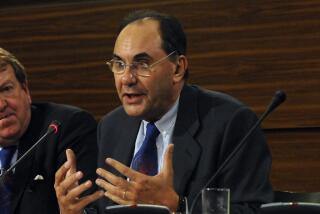Spain gives Catalan separatists deadline to back down on independence or face deposing of regional government
Spanish Prime Minister Mariano Rajoy on Wednesday ordered Catalonia’s separatist leaders to stop their push for independence by next week or face being deposed, and moved toward assuming control of the northeastern region.
Rajoy sent Catalonia’s president, Carles Puigdemont, a letter telling him to cease “grave actions contrary to the general interest of Spain.”
The letter represented the first step in the process of invoking Article 155 of the Spanish Constitution, which allows Madrid to take control of any Spanish region, stripping it of autonomy. The Times obtained a copy of the letter.
The Catalan leader has until Monday morning to clarify whether he has formally declared independence — a subject of confusion after his seemingly contradictory speech to the regional Catalan parliament a day earlier.
If Puigdemont replies that he has not made such a declaration, Rajoy said he would drop Article 155 proceedings. If the Catalan leader replies that he did indeed declare independence, he then would have until Thursday morning to reverse course. If he doesn’t do so, or fails to reply, Rajoy said he would ask for the Spanish Senate’s approval to oust the regional government.
The warning marked a deepening of Spain’s worst political crisis in decades.
Rajoy also gave a sharply worded speech in Madrid.
“One thing is absolutely clear: Our democracy is experiencing one of the gravest moments in its history,” he told Spanish lawmakers. Repeating the government’s contention that Catalonia alone cannot decide whether to secede, he declared that Spain “cannot be fragmented unless its citizens choose.”
Catalan leaders brushed aside the prime minister’s threat to invoke Article 155. Instead, they delivered a warning of their own: Imposing direct rule by Madrid would be a big mistake, and Spain stood to miss out on what might be a final chance for dialogue.
“Maybe it is the last opportunity we all have to reach a good solution for everyone,” said Carles Campuzano, the national parliament spokesman for the Catalan president’s party.
Puigdemont, in a closely watched address to Catalonia’s parliament on Tuesday, had sought to chart a middle course between declaring independence and backing away from it.
He said the outcome of the Oct. 1 vote in the region gave Catalonia the right to declare independence. But he then suspended applying the referendum result, which was overwhelmingly in favor of breaking away from Spain.
By Wednesday evening, Barcelona’s tapas bars were abuzz with discussions of Rajoy’s deadline, and what the region’s president had meant to say a day earlier.
“For me, it was not very straightforward. He’s just walking in circles,” said Eugenio Julia, 28, a Mexican-Spaniard who is worried the terms of his graduate school scholarship may change if Catalonia leaves Spain and thus the European Union.
In his speech, Rajoy left open the prospect of talks with Catalonia’s leaders, but not while any demand for independence remains active.
“Everything can be subject to dialogue, but not with parties who are espousing threats,” he told lawmakers.
Experts say international mediation — another of Puigdemont’s demands — has long been a red line for Madrid.
“There are many people offering themselves for mediation, but the central government has always refused, because it would imply that Mr. Puigdemont is more or less in the same position as the central government,” said constitutional law expert Xavier Arbos. “The idea of mediation will always be refused.”
The European Union has sided with Spain in its contention that the referendum was illegal, and neighboring European countries including France and Germany have said they would not recognize an independent Catalonia.
Rajoy seemed to evoke solidarity among the EU’s member states in his speech.
“What is happening in Catalonia has nothing to do with democracy as we know it in Europe,” the prime minister said. “We are faced with conduct, attitudes that are not part of civilized society.”
But an administrative takeover of Catalonia by the central Spanish government would be a drastic step. Article 155 has never been used in democratic Spain’s history.
Catalonia has its own parliament and police force and sets policy on matters like healthcare and education, but the central government handles matters such as tax collection, border security and external relations. Direct rule by Madrid could even involve arrest and prosecution of its separatist leaders.
A region of about 7.5 million people, Catalonia proudly clings to its own language and culture. It has become Spain’s richest region, with the tourist hub of Barcelona as its capital.
Some Catalans resent having their tax revenue subsidize poorer parts of Spain, and believe they would be even more prosperous as an independent country.
Defying Spanish court rulings, the region’s separatist leaders held the Oct. 1 independence referendum. About 90% of the nearly 2.3 million votes cast were in favor of independence, according to the Catalan regional government, but fewer than half the electorate took part in the referendum.
Opinion polls have indicated that Catalans are roughly equally divided on the question of independence, though majorities have said they would like the right to vote on the issue.
Special correspondent Frayer reported from Barcelona and Times staff writer King from Washington.
UPDATES:
4:20 p.m.: This article was updated with reactions to the prime minister’s comments and additional background.
9:05 a.m.: This article was updated with comments from a speech by Spain’s prime minister.
This article was originally published at 6:15 a.m.
More to Read
Start your day right
Sign up for Essential California for news, features and recommendations from the L.A. Times and beyond in your inbox six days a week.
You may occasionally receive promotional content from the Los Angeles Times.





